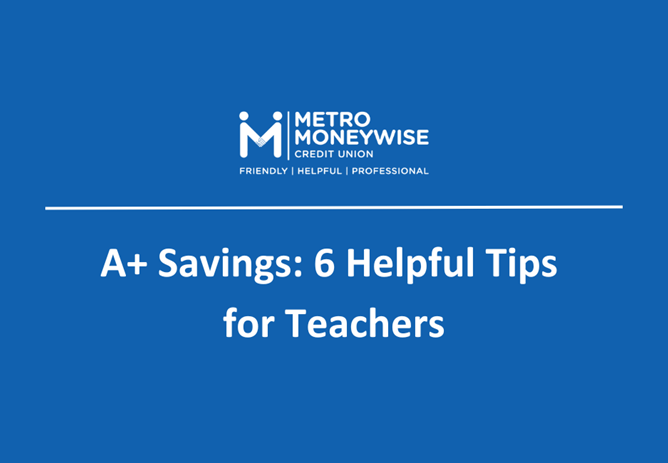24 September 2025
A+ Savings: 6 Helpful Tips for Teachers
With all the lesson planning, marking and extra-curricular activities, most teachers don’t have any time left to think about savings. Add that to the fact that salaries don’t really reflect the amount of time and effort required for the role, and you can see why many teachers haven’t got the safety net they’d like.
Below, we’ll list six tips that can change that. From budgeting basics to choosing a savings account, this guide will help you go from a budding scholar to top marks when it comes to saving money.
1. Nail the budgeting basics
First on the list is getting your budget in order. If you want to save money, you need to get an idea of what’s realistic. Use an app, spreadsheet or just pen and paper to list all your expenses, then deduct those from your income.
Factor in both fixed and variable costs:
- Fixed costs are things like rent, mortgage payments and utility bills.
- Variable costs include groceries, clothes, transport and nights out.
What’s left? That could potentially be the amount you save each week, month or year. If it’s not enough, you can play around with the variable costs to increase your savings.
If you’ve got something you really need to save for, like a wedding, then you’ll want to be more ambitious and cut back more variables. Maybe you can restrict yourself to one night out a month, for example. If you’re just saving for a rainy day, you might prefer to keep savings slow and steady without compromising on your lifestyle.
2. Set your savings goals
You might have figured out an amount you’re capable of each month, but this step is specifically about visualising that end goal. For example:
- Short-term goals: A holiday fund or small safety net in case anything goes wrong at home.
- Medium-term goals: A house deposit, wedding fund or bigger family trip.
- Long-term goals: Retirement, children’s education or large investments like starting your own business.
Figure out how long it will take using the numbers from the first step. You might want to go back and tweak your expenses if it’s going to take too long!

3. Choose the right account
Savings accounts are far from one-size-fits-all. Some lock in your savings, which isn’t ideal if your circumstances change. Others are easy to access but may not offer the same returns.
- For short-term goals, easy-access savings accounts are ideal. They keep your money safe while earning you a little extra each month or year.
- For medium-term goals, it’s worth considering cash ISAs. You can get higher interest rates by locking in your money for a few years and don’t pay tax on the interest you generate.
- Looking further ahead, you might want to opt for a stock and shares ISA, which has the potential for greater return – although there is an element of risk.
Whatever your preference, it pays to shop around and compare rates. Even the smallest difference in interest can stack up when you’re saving for several years.
4. Use a separate account
Having a separate account for your savings can help ring-fence that money so you’re not tempted to dip in. It’s like the old saying, “out of sight, out of mind”. Rather than constantly seeing that you have money sitting there for things you might want, you can let it steadily build up over the months and years.
You’ll automatically get a dedicated account if you set up an ISA or join a teacher’s credit union to save. But most online banks let you set up a separate account or “pot” for savings too.
5. Automate your savings
It’s also worth considering how you pay money into your savings. Doing it yourself every week or month is a slippery slope, where you can miss payments and eventually ditch your savings goals.
Payroll savings schemes are the easiest option, as they take the money directly from your salary. That’s a service we offer at Metro Moneywise. Get in touch with us to see if your employer is one of our payroll partners.
Alternatively, you can set up a direct debit or automatic transfer. Set the date as soon after payday as possible, so you don’t spend the money before it’s saved.
6. Stay flexible but committed
Remember that life is unpredictable, and you may have to dip into your savings for unexpected expenses. Bear this in mind when you’re thinking about how you’ll save. If you’re locking in savings, make sure you’re not leaving yourself high and dry financially.
Above all else, plan for flexibility. Be prepared to adjust your contributions if your circumstances change. Whether it’s a car repair or family emergency, you might face obstacles – but don’t let a setback derail your saving progress.
If you’re saving with us, our team is on hand to manage your payments for you. Just give us a ring or message us on the app and we’ll amend your savings to something more comfortable or ambitious.
Safe savings with your credit union
Metro Moneywise Credit Union provides a safe place to save for teachers across the UK. You’ll get interest on your savings in the form of an annual dividend. That’s your share of any money we make, as a not-for-profit organisation.
As part of our common bond, anyone working in education can join us to save safely and access responsible loans for teachers and education staff when needed. To find out more, simply contact our team – or join online today.



